Essential Oils and Feet: How Essential Oils Can Help Keep Your Feet Healthy
Foot care is an essential aspect of overall health, especially for those who suffer from diabetes or experience common serious foot pain or problems. Just as we pay attention to our skincare and haircare routines, our feet deserve the same level of attention and care. Essential oils and feet have gained popularity in recent years (even with podiatrists) for their versatile benefits, but did you know that they can also be a powerful ally in maintaining healthy, happy feet? In this blog post, we’ll explore the benefits of using essential oils for foot care, from odor control to infection prevention, and provide practical tips on how to incorporate them into your foot care routine.
Important Insights
- Essential oils provide relief for common foot problems, such as odor, sweat and soreness.
- Essential oils can reduce the risk of infection in individuals (even with diabetes) through their antibacterial and antifungal properties.
- Lavender oil, peppermint oil and eucalyptus oil are ideal additions to any foot care routine due to their calming (and other) effects & anti-inflammatory benefits.
Essential Oils for Common Foot Problems
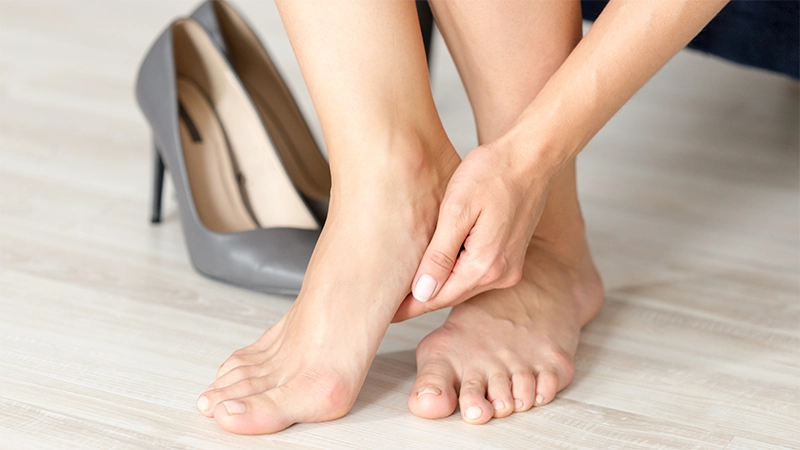
Essential oils are not just fragrant additions to your skincare routine; they are highly concentrated mixtures made up of organic chemicals that have the potential to provide relief from a range of ailments, including common foot problems like odor, sweat, and soreness. By choosing the right essential oils and knowing how to apply them properly, you can transform your foot care routine and enjoy the numerous benefits that these natural remedies have to offer.
So let’s dive into the world of essential oils and discover how they can help you maintain healthy, comfortable feet.
Essential Oils and Feet: Science and Symptoms
| Essential Oil | Components | Ailments/Symptoms |
|---|---|---|
| Lavender | Linalool, Linalyl acetate | Soreness, Dryness, Excessive perspiration |
| Peppermint | Menthol, Menthone | Dry feet, Athlete’s foot, Odor, Sweat |
| Eucalyptus | Eucalyptol, Alpha-terpineol | Pain, Swelling, Odor |
| Tea Tree | Terpinen-4-ol, Gamma-terpinene | Odor, Infection |
| Lemon | Limonene, Beta-pinene | Excessive perspiration |
| Rosemary | Alpha-pinene, Camphor | Poor circulation |
| Chamomile | Bisabolol, Chamazulene | Dryness |
| Cypress | Alpha-pinene, Delta-3-carene | Poor circulation |
Foot Odor Control
No one enjoys having smelly feet, and the culprit behind the unpleasant odor is usually bacteria that metabolize foot sweat. Fortunately, essential oils like tea tree, peppermint, and eucalyptus can come to the rescue with their antibacterial properties. By incorporating these oils into foot soaks and oil rubs, you can effectively eliminate odor-causing bacteria and maintain a pleasant foot scent.
Not only will your feet smell fresher, but you’ll also experience the relaxing and soothing properties of these essential oils, making your foot care routine a true spa-like experience.
Sweat Reduction
Excessive foot perspiration can lead to discomfort and even contribute to foot odor. The good news is that many essential oils are useful on your tootsies. Some of the best ones are:
- Tea tree
- Lemon
- Lavender
- Eucalyptus
Can help reduce foot perspiration and regulate moisture levels. To ensure your safety and effectiveness, always dilute these essential oils with a carrier oil before applying them to your feet.
By adding a few drops of these oils to your foot care routine, you can keep your feet feeling dry and comfortable throughout the day. Remember, when using essential oils for sweat reduction, it’s always a good idea to consult with a physician if you’re unsure about potential interactions with medications or other health concerns.
Soreness Relief
After a long day on your feet, you might experience muscle pain, soreness, aches, and pains. Essential oils like lavender, rosemary essential oil, and peppermint can provide relief from soreness and ease muscle pain thanks to their analgesic and anti-inflammatory properties.
One way to use these oils is by adding a few drops to a relaxing foot bath or applying them in a soothing oil rub for the feet. By incorporating these essential oils into your foot care routine, you can enjoy the therapeutic benefits they offer and give your tired, aching feet the relief they deserve.
Essential Oils for Foot Infections
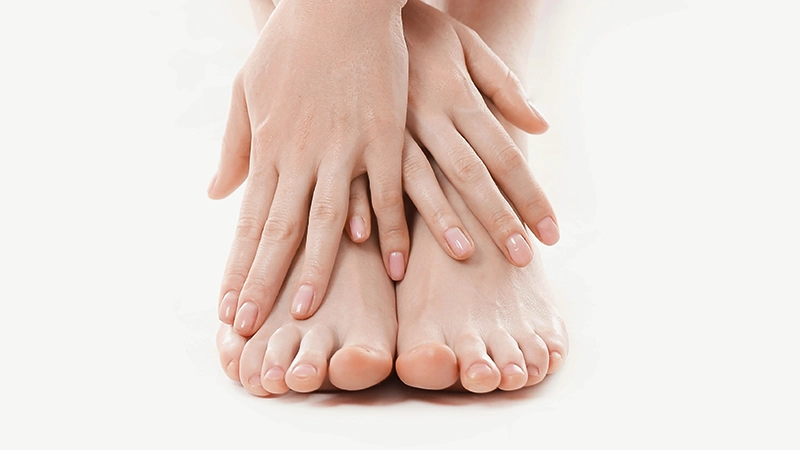
Foot infections, such as athlete’s foot and toenail fungus, can be uncomfortable and stubborn to treat. However, essential oils can offer a natural solution to these common issues, including athlete’s foot, thanks to their potent antifungal properties.
In this section, we’ll explore some of the most effective essential oils for treating foot infections, such as tea tree, lemon, and lavender, and discuss how to safely incorporate them into your foot care routine.
Tea Tree Oil
Tea tree essential oil has gained popularity for its antifungal and antibacterial properties, making it an excellent choice for treating foot infections. In addition to its effectiveness against fungal toenail infections, tea tree oil can also provide relief from insect bites.
To ensure the safe and effective use of tea tree oil for foot infections, always dilute it with a carrier oil before applying it to the skin. By incorporating tea tree oil into your foot care routine, you can combat infections and enjoy the various benefits this powerful essential oil has to offer.
Lemon Oil
Lemon essential oil is another essential oil with antifungal properties, making it a helpful ally in the fight against fungal infections. In addition to its potential benefits for foot infections, lemon oil has also been shown to reduce anxiety.
To make the most of lemon oil’s antifungal properties try using it on your cracked feet by incorporating it into foot soaks, oil rubs or a dead skin cells exfoliating routine. Just remember to always dilute it with a carrier oil before applying it to your skin to prevent irritation.
Lavender Oil
Lavender oil is renowned for its calming and soothing properties, but it’s also a powerful antifungal agent, making it an excellent choice for treating athlete’s foot and other fungal infections. To reap the benefits of lavender oil in foot care, apply it directly to the affected area or use it in a foot soak or with massage oil to help reduce inflammation and soothe the skin.
As with any essential oil, always dilute lavender oil with a carrier oil prior to application and perform a patch test on a small area of skin to ensure no adverse reactions occur.

Application Techniques for Essential Oils on Feet

Proper application techniques for essential oils on feet are crucial for safety and effectiveness. Whether you’re using essential oils for foot relaxation, stress and foot pain relief only, or to address specific foot issues, knowing the correct way to apply them can make all the difference in achieving the desired results.
In this section, we’ll discuss the various application techniques for essential oils on feet, from dilution with carrier oils to foot soaks and massages, and provide practical tips for ensuring a safe and enjoyable experience.
Dilution with Carrier Oils
Before applying essential oils to your skin, it’s important to dilute them with a carrier oil, such as coconut, almond, or olive oil. This helps to reduce the strength of the essential oil and avoid skin irritation.
Some of the best carrier oils for diluting the best essential oils include:
- Coconut oil
- Jojoba oil
- Sweet almond oil
- Grapeseed oil
The recommended dilution ratio for essential oils when used topically is one drop of essential oil for every teaspoon of carrier oil.
By diluting your essential oils with carrier oils, you can ensure a safe and effective way to apply essential oils while still enjoying their numerous benefits.
Foot Soaks and Massages
Foot soaks and massages with essential oils can provide relaxation and relief for tired, sore feet. By adding a few drops of your favorite essential oils to a warm foot bath or combining them with a carrier oil for a soothing, foot scrub or massage, you can enjoy the therapeutic properties of these natural remedies.
To create your own foot soak, simply mix the desired essential oils with warm water and soak your feet for 15-20 minutes. For a foot massage, blend your chosen essential oils with a carrier oil and gently massage the mixture into your feet, focusing on any areas of tension or discomfort.
By incorporating essential oils into foot soaks and massages, you can elevate your foot care routine and provide much-needed relief for tired, aching and swollen feet.

Sign Up to Get Your FREE Essential Oils e-Book Here
Precautions and Safety Tips
When using essential oils on your feet, it’s important to follow safety precautions to ensure a positive experience. These precautions include:
- Diluting essential oils with a carrier oil before application
- Avoiding sensitive areas
- Performing a skin patch test prior to the initial application to check for any reactions
Additionally, be aware of potential risks associated with incorrect or excessive use of essential oils, such as toxicity, allergic reactions, and contact sensitivity.
By following these safety tips and consulting a healthcare provider if necessary, you can enjoy the benefits of essential oils for foot care with confidence and peace of mind.
Essential Oils for Diabetic Foot Care
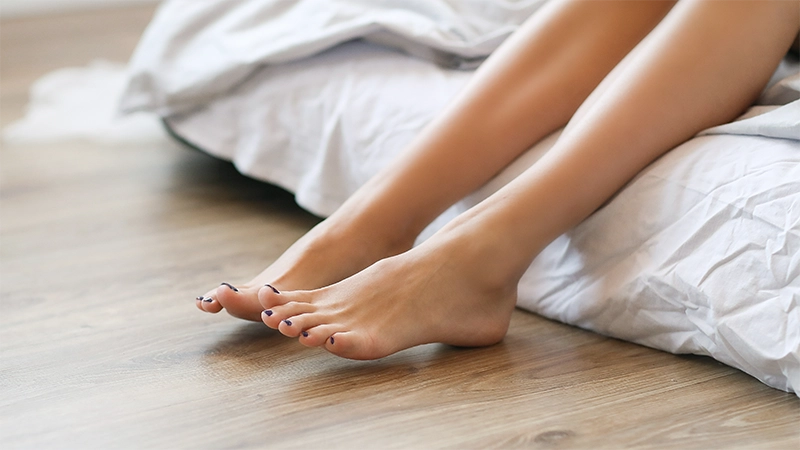
Diabetic foot care is essential for maintaining overall health and preventing complications. Essential oils can play a significant role in diabetic foot care, helping to restore moisture, improve circulation, and prevent infections.
In this section, we’ll explore the benefits of essential oils for diabetic foot care, including:
- Lavender
- Chamomile
- Rosemary
- Cypress
- Tea tree
We’ll also provide practical tips on how to incorporate these essential oils into your daily routine, including the best essential oil recipes too.
Moisture Restoration
For individuals with diabetes, maintaining proper moisture levels in the feet is crucial to prevent dryness and cracking. Essential oils like lavender and chamomile can aid in moisture restoration of dead skin due to their moisturizing properties. To enjoy the benefits of these oils for diabetic foot care, try incorporating them into foot soaks or oil rubs, always diluting them with a carrier oil before applying them to your skin.
By maintaining proper moisture levels in your feet, you can relieve pain, prevent complications and enjoy healthier, more comfortable feet.
Circulation Improvement
Poor circulation is a common issue for individuals with diabetes, and essential oils like rosemary, and even a cypress oil, can help improve blood flow in the feet due to their warming and stimulating effects. By incorporating these oils into your foot care routine, you can promote better circulation and help prevent potential complications related to diabetes.
As always, ensure that you dilute these essential oils with a carrier oil before applying them to your skin to avoid irritation and ensure a safe, effective application.

Join Now and Get a Coupon for 10% Off!
Infection Prevention
Infection prevention is vital for individuals with diabetes, as they are more prone to developing foot infections due to poor circulation and reduced sensation. Essential oils like tea tree and eucalyptus can help support infection prevention, thanks to their antibacterial and antifungal properties.
Incorporate these oils into your foot care routine by using them in foot soaks or oil rubs, always diluting them with a carrier oil prior to application. By taking a proactive approach to infection prevention, you can maintain healthy feet and minimize the risk of complications related to diabetes.
Essential Oils for Gout
It is important to point out that essential oils can even be used to lessen and ameliorate the pain and other symptoms experienced by sufferers of gout. If you want to learn more make sure you also read our extensive guide on essential oils for gout therapy.
Essential Oils for Feet Relaxation and Stress Relief

After a long day, your feet may feel tired and achy, making relaxation and stress relief a welcome relief. Essential oils like lavender, peppermint, and eucalyptus can provide soothing benefits to a homemade DIY body wash that can help alleviate the discomfort and stress experienced by your feet.
In this section, we’ll explore the benefits of each of these essential oils and discuss how you can incorporate them into your foot care routine for ultimate relaxation and stress relief.
Lavender Oil
Lavender oil is well-known for its calming and soothing properties, making it an excellent choice for foot relaxation. Applying lavender oil directly to the soles of your feet can aid in sleep and provide a sense of tranquility. Remember to dilute lavender oil with a carrier oil before applying it to your skin and perform a patch test on a small area of skin to ensure no adverse reactions occur.
Incorporate lavender oil into your foot care routine to enjoy its soothing benefits and promote overall relaxation.
Peppermint Oil
Peppermint oil has a cooling effect that can help relieve fatigue and muscle inflammation in the feet. Incorporate peppermint oil into your foot care routine by diluting it with a carrier oil and applying it to the affected areas, or by adding a few drops to a foot soak for a refreshing and invigorating experience.
As with any essential oil, always dilute peppermint oil with a carrier oil before applying it to your skin and perform a patch test on a small area of skin to ensure no adverse reactions occur.
Eucalyptus Oil
Eucalyptus essential oil is known for its refreshing scent and ability to help reduce pain and swelling in the feet. Its benefits include:
- Anti-inflammatory properties
- Circulatory properties
- Relief from discomfort
- Promotion of overall relaxation
It is a great addition to your foot care routine.
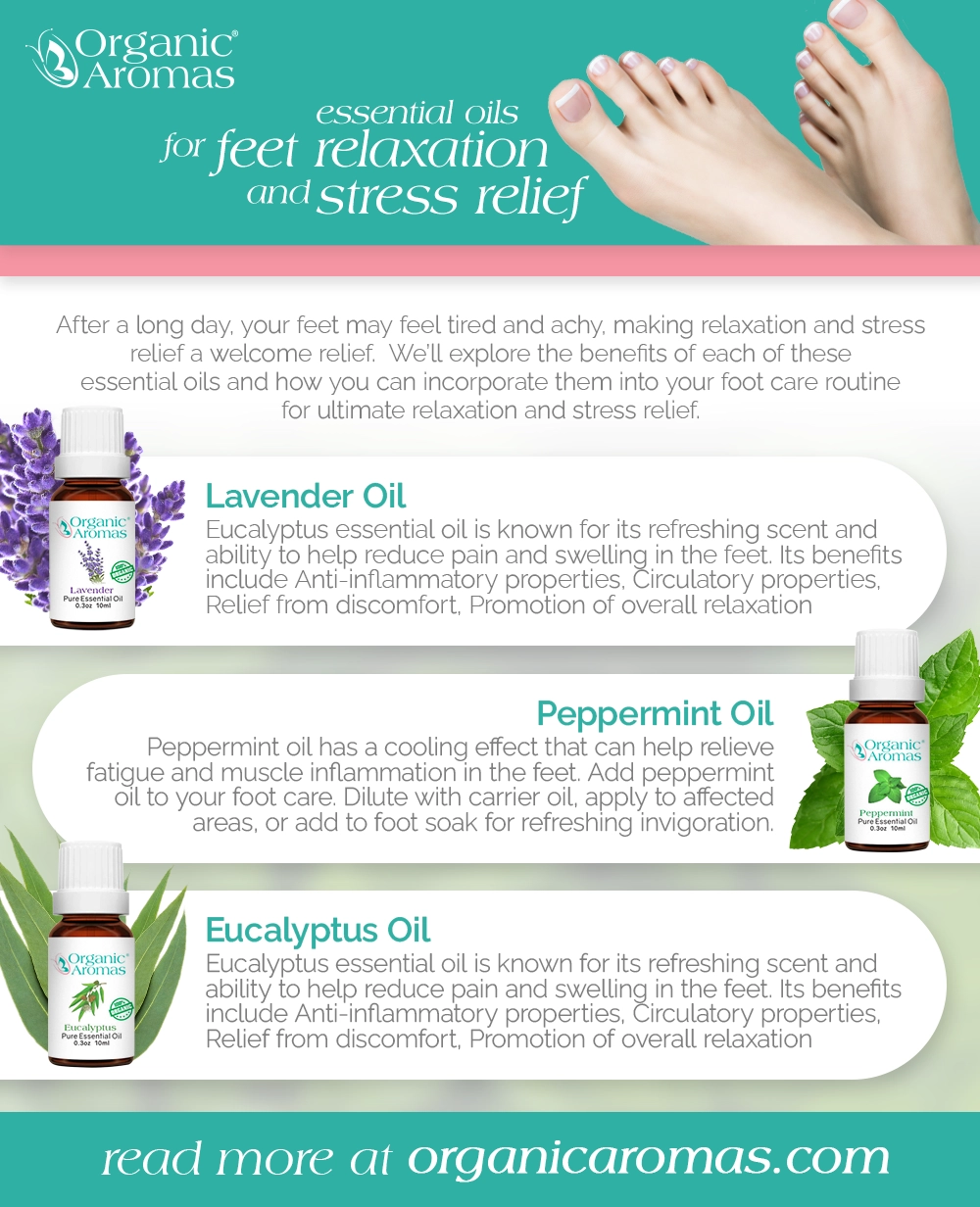
To use eucalyptus oil for foot relaxation and stress relief, dilute it with a carrier oil and apply it directly to the affected areas, or add a few drops to a foot soak for a revitalizing experience. As always, remember to dilute eucalyptus oil with a carrier oil before applying it to your skin and perform a patch test on a small area of skin to ensure no adverse reactions occur.
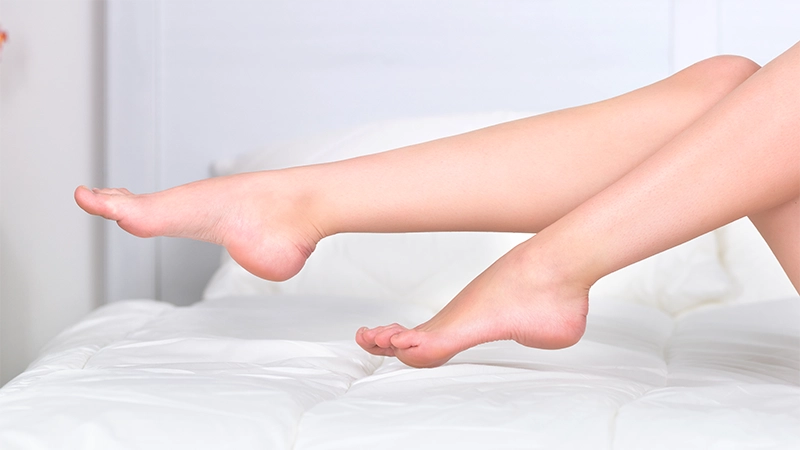
Everything you need to know about essential oils and feet
In conclusion, essential oils offer a wide range of benefits for foot care, from odor control and sweat reduction to infection prevention and diabetic foot care. By incorporating essential oils like lavender, peppermint, and eucalyptus into your foot care routine, you can enjoy their numerous therapeutic properties and give your feet the care and attention they deserve. Just remember to follow safety precautions, such as diluting essential oils with carrier oils and performing a patch test, to ensure a safe and enjoyable experience. So why not give essential oils a try and elevate your foot care routine to new heights of relaxation and well-being?
Frequently Asked Questions
-
What does putting essential oils on your feet do?
Essential oils applied to the feet can help restore the skin, reduce tension, relieve stress and promote relaxation. This is possible because the skin on the feet is thicker, less sensitive, and has larger pores than the rest of the entire body.
-
Which essential oil is best for feet?
For relief from dry feet, peppermint essential oil is an excellent natural option. It can also be used to treat athlete’s foot with other essential oils such as tea tree, lemon, lavender, lemongrass, eucalyptus, and geranium.
Lavender essential oil is another popular choice for soothing sore and tired feet. Lastly, the top 10 essential oils recommended for the bottom of feet include tea tree, lavender, eucalyptus, peppermint, lemongrass and even citrus oils as well.
-
How can I use essential oils for foot odor control?
Essential oils such as tea tree, peppermint, and eucalyptus can help control foot odor by eliminating bacteria when used in foot soaks and oil rubs.
These oils can be used in a variety of ways, including adding a few drops to a foot soak or rubbing the oil directly onto the feet. The antibacterial properties of the oils help to reduce the bacteria that cause foot odor. Additionally, the oils can help to help.
-
How can I safely apply essential oils to my feet?
Make sure to dilute your essential oils with a carrier oil, perform a patch test on a small area of skin before applying, and avoid applying to broken skin or sensitive areas for safe use on feet.
It is important to take precautions when using essential oils on your feet. Diluting the oils with a carrier oil is the first step. Then perform a patch test on a small area of skin before applying the oil. Finally, avoid applying the oil to broken skin or sensitive areas.
It is important to take precautions when using essential oils on your feet. Diluting the oils with a carrier oil is the first step. Then perform a patch test on a small area of skin before applying the oil. Finally, avoid applying the oil to broken skin or sensitive areas.







